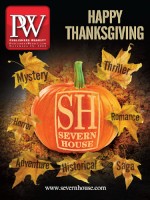In If Kennedy Lived: The First and Second Terms of President John F. Kennedy (Putnam, Oct.), Jeff Greenfield explores what President Kennedy might have done after Dallas.
How did you research this book?
I used the same approach as I did with Then Everything Changed, my earlier book of speculative American political history—a lot of reading, and a series of interviews. I read several J.F.K. biographies. Robert Dallek’s book is particularly strong on J.F.K.’s health, because he was granted unprecedented access to Kennedy’s health records. Robert Caro’s fourth L.B.J. volume renders the events in Dallas in powerful detail—and his account of the troubles L.B.J. would have faced were it not for the assassination was important guidance for me.
Who were some of the people you consulted as part of your research?
Richard and Doris Kearns Goodwin were among those I interviewed—Dick is one of the only J.F.K. White House staff members still around, and Doris’s work on L.B.J. is indispensable. I talked to folks like historian Michael Beschloss, journalist friends and colleagues, and—of special importance—a number of participants and observers of the cultural upheavals of the mid-to-late 1960s to get their take on what a J.F.K. presidency without a Vietnam War might have meant. Special attention should be placed on Virtual JFK—a book solely devoted to the issue of what Kennedy might have done in Vietnam. It’s based on a 2005 conference and includes competing views of this question, as well as a host of important documents.
Would the generation gap and the culture wars that broke out in the 1960s have been as severe if J.F.K. had lived?
The death of Kennedy darkened what was an exceptionally optimistic time in American life. There was a sense that “if this could happen, anything could happen.” More important, the escalation of Vietnam made the “culture wars” much more grim than they would otherwise have been, since it convinced some in the counterculture that America was an evil, aggressive power. So any judgment about the culture’s “kinder, gentler” tone has to assume that Kennedy would not have escalated that war (which I do). Sex, drugs, and rock and roll still would have produced cultural backlash among more traditional Americans, but absent flag-burning, violent protests, and draft card burning, it would have been a less intense culture war.
What do you hope readers take away from this book?
Shakespeare wrote: “There’s a divinity that shapes our ends, rough-hew them how we will.” My notion is: “Life doesn’t turn on a dime; it turns on a plugged nickel.” And for those in my chosen field, obsessed with the need to predict, a reminder of the sheer “randomness” of so much history might serve as a cautionary tale—though I doubt very much that it will.



 Volume 260
Issue 46
11/18/2013
Volume 260
Issue 46
11/18/2013





